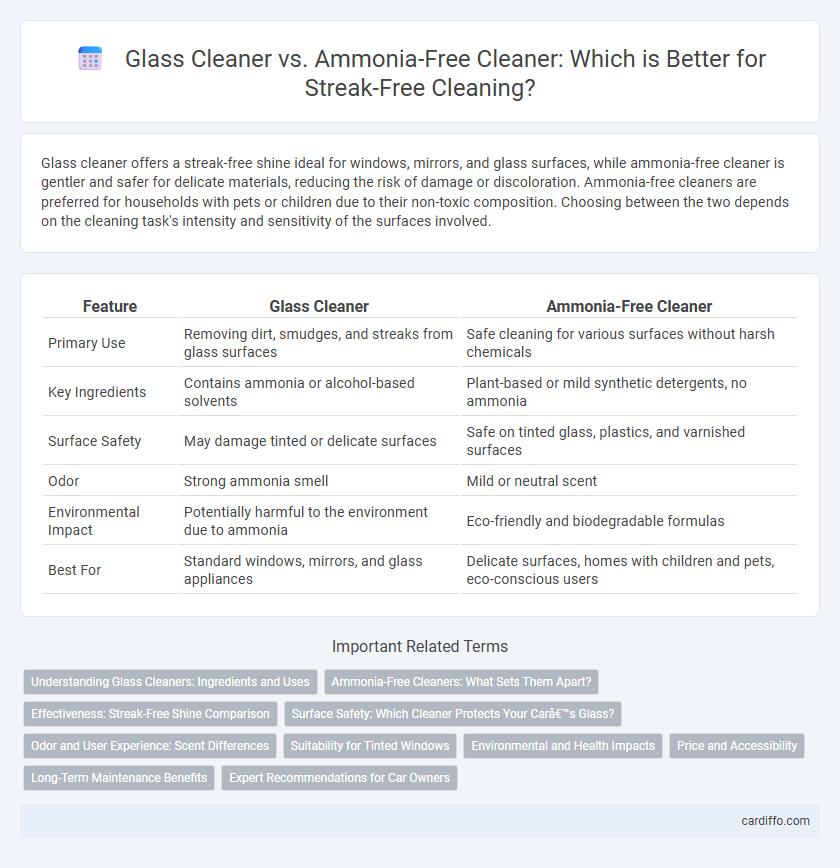Glass cleaner offers a streak-free shine ideal for windows, mirrors, and glass surfaces, while ammonia-free cleaner is gentler and safer for delicate materials, reducing the risk of damage or discoloration. Ammonia-free cleaners are preferred for households with pets or children due to their non-toxic composition. Choosing between the two depends on the cleaning task's intensity and sensitivity of the surfaces involved.
Table of Comparison
| Feature | Glass Cleaner | Ammonia-Free Cleaner |
|---|---|---|
| Primary Use | Removing dirt, smudges, and streaks from glass surfaces | Safe cleaning for various surfaces without harsh chemicals |
| Key Ingredients | Contains ammonia or alcohol-based solvents | Plant-based or mild synthetic detergents, no ammonia |
| Surface Safety | May damage tinted or delicate surfaces | Safe on tinted glass, plastics, and varnished surfaces |
| Odor | Strong ammonia smell | Mild or neutral scent |
| Environmental Impact | Potentially harmful to the environment due to ammonia | Eco-friendly and biodegradable formulas |
| Best For | Standard windows, mirrors, and glass appliances | Delicate surfaces, homes with children and pets, eco-conscious users |
Understanding Glass Cleaners: Ingredients and Uses
Glass cleaners typically contain ammonia, effective for cutting grease and leaving a streak-free shine on windows and mirrors, while ammonia-free cleaners use alternative solvents like alcohol or plant-based agents to reduce respiratory irritation and surface damage. Understanding the chemical composition helps choose the right product for specific surfaces; ammonia-based cleaners excel on tough grime, whereas ammonia-free formulas are safer for tinted glass, laminated surfaces, and sensitive materials. Selecting the appropriate glass cleaner enhances cleaning efficiency and preserves the integrity of delicate finishes and coatings.
Ammonia-Free Cleaners: What Sets Them Apart?
Ammonia-free glass cleaners are formulated to provide streak-free shine without the harsh fumes and potential surface damage associated with ammonia-based products. These cleaners often utilize safer ingredients like surfactants and plant-based solvents, making them ideal for sensitive environments such as homes with children or pets. Their gentle yet effective composition preserves window tint and fragile materials, offering a safer, eco-friendly alternative for routine glass cleaning.
Effectiveness: Streak-Free Shine Comparison
Glass cleaners containing ammonia deliver a powerful streak-free shine by breaking down grease and grime quickly, making them ideal for stubborn dirt on windows and mirrors. Ammonia-free cleaners, while gentler and safer for tinted or sensitive surfaces, may require additional wiping to achieve a completely streak-free finish. Choosing between them depends on balancing the need for aggressive cleaning with surface safety and environmental concerns.
Surface Safety: Which Cleaner Protects Your Car’s Glass?
Glass cleaner typically contains ammonia, which provides streak-free shine but can be harsh on tinted or sensitive car windows, potentially causing damage over time. Ammonia-free cleaners use gentler formulations that protect window tint and delicate surfaces while effectively removing dirt and grime. Choosing an ammonia-free cleaner ensures safer maintenance of your car's glass, preserving both clarity and surface integrity.
Odor and User Experience: Scent Differences
Glass cleaners with ammonia typically have a strong, pungent odor that may cause discomfort or irritation during use, whereas ammonia-free cleaners offer a milder, often fragrance-enhanced scent that improves user comfort. Ammonia-free options reduce the risk of respiratory irritation and leave behind a fresher smell, making them preferable for sensitive users or indoor environments with poor ventilation. Choosing an ammonia-free glass cleaner enhances the overall cleaning experience by balancing effectiveness with a more pleasant and less harsh odor profile.
Suitability for Tinted Windows
Glass cleaner containing ammonia can damage tinted windows by causing the tint film to peel or discolor over time. Ammonia-free cleaners are specifically formulated to be safe for tinted glass, preserving the window's clarity and tint integrity. Using ammonia-free products extends the lifespan of tinting while providing effective cleaning without streaks or residue.
Environmental and Health Impacts
Glass cleaners containing ammonia can cause respiratory irritation and contribute to indoor air pollution, posing risks for sensitive individuals and the environment. Ammonia-free cleaners typically use biodegradable ingredients that minimize toxic emissions and reduce environmental contamination. Choosing ammonia-free options supports healthier indoor air quality and lowers the ecological footprint of cleaning activities.
Price and Accessibility
Glass cleaners typically offer a lower price point and are widely available in supermarkets and hardware stores, making them accessible for everyday cleaning tasks. Ammonia-free cleaners often come at a higher cost due to their specialized, eco-friendly formulas and can be found primarily in health stores or online retailers. The affordability and broad distribution of glass cleaners make them a preferred choice for budget-conscious consumers seeking effective window and glass surface cleaning.
Long-Term Maintenance Benefits
Glass cleaners with ammonia provide strong grease and fingerprint removal, but frequent use can cause streaks and surface etching over time. Ammonia-free cleaners are gentler on surfaces, reducing the risk of damage and discoloration, which supports better long-term maintenance. Choosing ammonia-free formulations helps preserve glass clarity and extends the lifespan of coatings and seals.
Expert Recommendations for Car Owners
Expert recommendations for car owners emphasize using ammonia-free cleaners to protect tinted windows and preserve interior surfaces, as ammonia can cause discoloration and damage. Glass cleaners with ammonia are effective for removing tough grime but should be avoided on sensitive car glass. For maintaining clarity and longevity, professionals advise choosing specialized ammonia-free formulations designed specifically for automotive glass.
Glass Cleaner vs Ammonia-Free Cleaner Infographic

 cardiffo.com
cardiffo.com